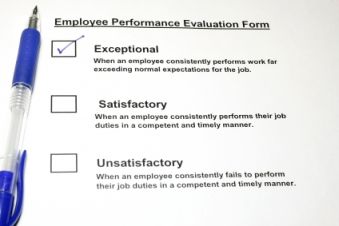EMPLOYEE PERFORMANCE EVALUATIONS
Employee Evaluations
"Yancey its time for employee performance evaluations, you got a few minutes?" Like many employees, I used to tremble when I got this phone call. The manager always has that tone of gloom and doom! He still does but I don't fear an employee evaluation anymore. Why? Because I learned what they are all about and so can you. In fact, that's what this page is all about.

An evaluation of job performance is done by employers to determine whether you are meeting the requirements of the job.
If not, then the job performance evaluation should outline ways for you to improve. I remember that "fear of the unknown feeling" very well.
My fellow employees I never thought I'd hear myself say this but it's true. If your boss does a good job of putting together a job performance evaluation it works for both of you.
However, the evaluation has to be done fairly and correctly. But, what does "fairly and correctly mean?" Well I'm glad you asked. A fair and correct job evaluation must line up with the following:
- Nondiscriminatory in dealing with sex,race,religion,culture group,political affiliation,age or sexual orientation.
- Done on a regular schedule so you know when to expect it.
- Should only deal with job related issues.
- Created in such a way that all employees in the same job classification are evaluated the same.
- Should have understandable and reasonable expected goals for your position.
- Should not be verbal but always written. Let me say that again, never verbal but always written.
- Should address every part of your job and be to the point.
- Never written subjectively but always descriptively. Let me say that again, never subjective but always descriptive or objective.
When employee performance evaluations occur is different from employer to employer. Some do them every three months, six months or every year. A lot of companies will do an evaluation at the end of a new employee's probation period.
employee performance evaluations
Job Performance Evaluations
The goal of the job evaluation process is to reveal an employee's success or failure on the job. Therefore, it must provide an opportunity for you and your manager to ask and answer questions. A company must have good policies and written guidelines in understandable language for its employees.
The evaluation process
should always have a stated goal of what it is supposed to accomplish. If your manager or supervisor doesn't provide you with written documentation about what the goal of the evaluation is, make sure you find out before the evaluation begins. Our employers are obligated to conduct evaluations in a confidential manner.
Companies will sometimes have someone sit in an evaluation or do a
panel evaluation. I'm leery of this practice not only because of the privacy issue, but also because of collusion between departments. For example, if for some unjustified reason your manager wanted to fire you she might
"conspire" with someone in human resources to sit in on your evaluation. Then you receive notification of something negative being place in your personnel file.
I would make sure before the evaluation began whether someone other than the supervisor is going to be present and why. Tell your manager about your discomfort before the evaluation begins. If you believe your right to privacy in the job evaluation may be violated, write down everything that's said in the evaluation. I always document what takes place in the evaluation process anyway. Take your time and don't allow yourself to be rushed or hurried. If my supervisor has a problem with me documenting the company's job evaluation methods that would be a big red flag about its intentions.
employee performance evaluations
Workplace Evaluation
When reviewing the performance evaluation form with your supervisor find out if pay increases are involved. Ask what is the standard that determines whether you get a raise, such as a company wide step plan, point system, cost of living, etc. I always make sure I have a clear understanding of evaluations when it comes to compensation. How you score in a performance evaluation that affects your pay should also be in writing.
I have commented on many blogs and written several articles about this next tip. Never assume that your supervisor or manager knows what he/she is doing when it comes to conducting job evaluations or any aspect of your employment experience. Many times supervisors have not been properly trained. Even with training they may bring all types of bias and discriminatory attitudes into the workplace.
For example, before and during an evaluation process a manager made these statements, "You're not going to like your evaluation", "I rated you this way because you don't come and talk to me (shoot the breeze or brown nose) like the other guys do", "I know you feel you're being treated differently".

Not only is this a perfect example of subjective evaluating (assuming what I'm going like or not like),
(I don't try to earn brownie points by kissing up to him),(telling me what I feel) it's also a classic example of incompetence in handling a job
evaluation. Oh, by the way this individual had a degree in divinity but was given a position as an IT manager! I recall numerous instances when I have to train and refresh him concerning various IT functions. This same individual was instructed to evaluate me two months after his hire date! The learning curve for his own position was about two years.
Not only did this manager have no IT experience, he was not qualified for his position. Yet, he assumed to evaluate me in my IT position! To show how absolutely incompetent he was, he actually put in writing in my evaluation he was not qualified! Anytime you get written documentation, whether evaluations, memos, letters, notes or emails from supervisors that will help you prove you are being treated disparately, unfairly or unlawfully keep and make copies!!
employee performance evaluations
Job Evaluation
Employee performance evaluations should always reflect and focus on what the employee was hired for. For example, the job description for customer service involves meeting, greeting, recording, answering questions and directing customers to the appropriate company personnel. The employee should be evaluated on whether she did this within the specific evaluation time period.
If the employee performed all these duties consistent with the job description this is an example of an "objective" performance evaluation. If the manager judges the employee on his personal criteria such as "her level of enthusiasm", "she doesn't appear serious enough at times" these are "subjective" examples of employee performance evaluation.
This is one of the reasons I personally do not like the subjective element of workplace evaluations. On one occasion in what I thought was a casual meeting with my manager I mentioned how dull some of the classes were that an HR person taught and how I didn't like taking them. Several months later during my evaluation, I was given a negative rating in the "gets along with co-workers category".
Of course I asked what was the incident or incidents to justify this rating, what the manager said next was truly amazing. This isn't exact but it's pretty close. "Yancey HR person has a job to do and just because you don't like her you still have to get along with her". So the manager "subjectively" put words in my mouth that went from me not liking some of HR person's classes to me not liking HR person personally.
employee performance evaluations
I asked the manager "When did I say I didn't like the HR person?" His response was, "That's what you meant?"
Now the manager was telling me what was in my mind and my heart! After reiterating exactly what I said, he refused to remove that erroneous language.
This rating pointed to the overall incompetence of this manager. It also revealed my employer's
"bad faith" intent. It is critical that employees make sure employers provide specific information detailing the justification for a negative evaluation.
When you have been given an unsatisfactory evaluation the employer has to give you an opportunity to improve. Specific guidelines should be provided in how to do this in the areas of concern. If the evaluation process is done in
"good faith" it should provide for a healthy and positive employment experience for both employer and employee.
Your employer should provide documentation and keep you informed about the quality or lack thereof of your work experience on a regular basis. When companies do not perform regularly scheduled employee performance evaluations the employment decisions they make may be viewed as inconsistent and preferential. This practice might give you an advantage if your boss tried to demote or fire you.
If our employers try to terminate us for poor job performance without giving us an opportunity to improve then there may be an issue of
workplace discrimination. Unfortunately employers who have a
"bad faith" intent will seek to create negative, subjective, distorted and false documentation in a employee performance evaluation and a permanent personnel file. This practice is sometimes called
"dirtying the file".
Do you know someone that needs to read this page on employee performance evaluations? If so then TELL A FRIEND below.

employee performance evaluations
If you believe you were fired unjustly for poor job performance, courts will believe what the employer wrote about you and what you wrote in response. The court will not give the
"He said, She said, They said, We said" back and forth verbal dialogue the same level of credibility. As I mentioned earlier, never assume the supervisor is properly trained in conducting evaluations.
Let's say you lose your job for alleged poor job performance hire a lawyer and sue. You give your attorney written evaluations showing your manager always rated you satisfactorily. Then the employer produces documentation that shows you were tardy on numerous occasions, there were many user complaints about you and you were consistently accountable for the failure of critical production projects.
Managers who want to be "liked by everyone", "want to avoid conflict", "are afraid to criticize" routinely give employee performance evaluations that are not accurate. When you apply for other jobs and wonder why you don't get hired it might be because the former employer is not giving you a good reference as you were led to believe he would.
As employees we have to face the fact that we may not be doing a satisfactory job, that's why it is critical to
learn your basic employee rights, always strive to provide excellent job performance and learn all you can about the job evaluation process.
employee performance evaluations
Employee Performance Evaluation Form
During my thirty plus years of being an employee and business owner I have encountered far more poorly trained job performance evaluators than not. That is one of the main reasons I have rarely if ever signed a warning, reprimand or job evaluation good or bad. Let me say that again, I have rarely if ever signed a warning, reprimand or job evaluation good or bad!
Some managers will try to intimidate you into signing reprimands, warnings or employee performance evaluations.
I have had them say things like, "Are you sure you don't want to sign?", "It's in your best interests to sign it", "I really need for you to sign it", "It's not going to be good if you don't sign it".
That's the "bad cop" approach. Others will try the "good cop" method with, "You are just agreeing that I've gone over it and you understand it", "It's just for yours and our records", "You're not admitting anything be signing it".

To my knowledge you are not legally obligated to sign an evaluation. Unless there was some pre employment condition which might involve an agreement to mediation or arbitration of employment disputes. Believe me if it ever gets to a situation where you sue your employer for some adverse employment action,
one of the first things the court will look at is any and all signed documents including job evaluation forms. Trust me, your employer will try to use anything you signed against you, especially negative employee performance evaluations, warnings or reprimands. Your boss will say "she signed it so she agreed with it".
The bottom line is, employee performance evaluations should always reflect a fair and accurate summary of an employee's past job performance. The evaluation should also provide a fair opportunity for the employee to improve in the next evaluation period if necessary. Follow this link to see what a typical performance evaluation sample looks like.
My new sites provides the
MOST current changes affecting career seekers and employees. Some employers are constantly working to take away the rights of employees. Follow this link to
EMPLOYEE RIGHTS GUIDE,
EMPLOYEE WORKPLACE RIGHTS and
EMPLOYEE RIGHTS VIDEOS for the latest employee news you can use!
What matters to me...is to help my fellow employee!
Return from Employee performance evaluations to Employee performance reviews
Enjoy this page? Please pay it forward. Here's how...
Would you prefer to share this page with others by linking to it?
- Click on the HTML link code below.
- Copy and paste it, adding a note of your own, into your blog, a Web page, forums, a blog comment,
your Facebook account, or anywhere that someone would find this page valuable.












